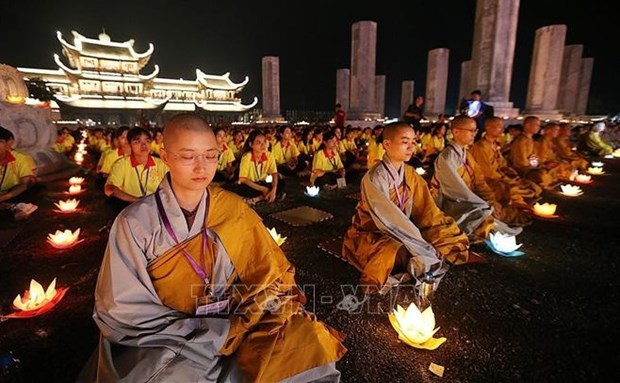Measures needed to consolidate management of religious activities on cyberspace
Religious activities on social networks have become increasingly diverse amid the Fourth Industrial Revolution. However, apart from proper practices, some individuals and organisations have taken advantage of the internet to carry out illegal activities, which requires state agencies to take countermeasures.
 Buddhist monks, nuns, and followers at a ceremony marking the UN Day of Vesak in 2019 (Photo: VNA)
Buddhist monks, nuns, and followers at a ceremony marking the UN Day of Vesak in 2019 (Photo: VNA)About 95 percent of Vietnam’s population engage in religious or belief-related practices. Sixteen religions with 43 relevant organisations have been recognised and licensed by the State. They gather over 27 million followers (about 28 percent of the population) and have nearly 30,000 places of worship.
Amid the strong development of the “digital life”, religious activities on the cyberspace are a sensitive issue that reactionary and sabotage forces have continually taken advantage of to drive a wedge in the great national unity and between the Party and the people.
Many activities on the internet have made use of religions or beliefs to distort the doctrines of orthodox religions and propagandise heresies and information running counter to good traditional customs. Such activities involve not only people living in the country but also those abroad, including hostile and reactionary elements as well as saboteurs.
By creating the crowd effect or scandals to attract public attention, they have spread misinformation about orthodox religions, driven a wedge to the national solidarity, and defamed the Party, the State, and the religious policy of Vietnam. In particular, they have frequently fabricated allegation on the administration’s discrimination against and suppression of religions so as to sow divisions in Vietnam and undermine the country’s prestige in the international arena. They have also colluded with some foreign individuals and organisations to slander the freedom of religion in Vietnam.
Suggesting some solutions to improve the management of religious and belief-related activities on cyberspace, Dr Bui Van Huan from the School of Politics of Bac Giang province said first of all, it is necessary to increase communications in appropriate forms to help users of social networks realise the plots and ruses used by hostile forces and not follow heresies or take part in illegal religious organisations. Religious dignitaries should play a more active role in fighting the abuse of religions and beliefs to disseminate wrongful viewpoints and information.
Second, state agencies should step up fine-tuning legal documents on religious and belief-related activities on cyberspace and effectively enforcing them.
Third, it is important to actively prevent and effectively deal with illegal religious activities on the internet while increasing measures to prevent plots and actions abusing religions or beliefs to sabotage the Party, State, and regime or taking advantage of the freedom of speech to sow divisions on the internet.
Fourth, it is also necessary to bring into play the role of the Episcopal Council of Vietnam and the Executive Council of the Vietnam Buddhist Sangha to rectify wrong practices on cyberspace; maintain dialogue about the Catholic situation in Vietnam with the Holy See; keep regular contact with the US Ambassador and the Ambassador and head of the EU Delegation to Vietnam to exchange information about the enforcement of laws on religions and beliefs in the country; and provide official information to serve the combat against hostile forces slandering the democracy, human rights, and religious freedom in Vietnam, according to Huan./.













